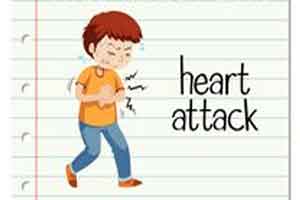- Home
- Editorial
- News
- Practice Guidelines
- Anesthesiology Guidelines
- Cancer Guidelines
- Cardiac Sciences Guidelines
- Critical Care Guidelines
- Dentistry Guidelines
- Dermatology Guidelines
- Diabetes and Endo Guidelines
- Diagnostics Guidelines
- ENT Guidelines
- Featured Practice Guidelines
- Gastroenterology Guidelines
- Geriatrics Guidelines
- Medicine Guidelines
- Nephrology Guidelines
- Neurosciences Guidelines
- Obs and Gynae Guidelines
- Ophthalmology Guidelines
- Orthopaedics Guidelines
- Paediatrics Guidelines
- Psychiatry Guidelines
- Pulmonology Guidelines
- Radiology Guidelines
- Surgery Guidelines
- Urology Guidelines
Insomnia associated with increased risk of heart attack and stroke: European Journal of Preventive Cardiology.

Sophia Antipolis : Insomnia is associated with increased risk of heart attack and stroke, according to research published today in the European Journal of Preventive Cardiology.
"Sleep is important for biological recovery and takes around a third of our lifetime, but in modern society more and more people complain of insomnia," said first author Qiao He, a Master's degree student at China Medical University, Shenyang, China. "For example, it is reported that approximately one-third of the general population in Germany has suffered from insomnia symptoms."
"Researchers have found associations between insomnia and poor health outcomes," continued Miss He. "But the links between insomnia and heart disease or stroke have been inconsistent."
The current meta-analysis assessed the association between insomnia symptoms and incidence or death from cardiovascular disease (acute myocardial infarction, coronary heart disease, heart failure), stroke, or a combination of events. Insomnia symptoms included difficulty initiating sleep, difficulty maintaining sleep, early-morning awakening, and non-restorative sleep.
The authors analysed 15 prospective cohort studies with a total of 160 867 participants. During a median follow-up of three to 29.6 years, there were 11 702 adverse events.
There were significant associations between difficulty initiating sleep, difficulty maintaining sleep, and non-restorative sleep and the risk of heart disease and stroke, with increased relative risks of 1.27, 1.11, and 1.18, respectively, compared to those not experiencing these insomnia symptoms. There was no association between early-morning awakening and adverse events.
Miss He said: "We found that difficulty initiating sleep, difficulty maintaining sleep, or non-restorative sleep were associated with 27%, 11%, and 18% higher risks of cardiovascular and stroke events, respectively."
"The underlying mechanisms for these links are not completely understood," continued Miss He. "Previous studies have shown that insomnia may change metabolism and endocrine function, increase sympathetic activation, raise blood pressure, and elevate levels of pro inflammatory and inflammatory cytokines all of which are risk factors for cardiovascular disease and stroke."
Women with insomnia symptoms had a slightly higher risk of cardiovascular and stroke events than men, especially for non-restorative sleep, but the difference between sexes did not reach statistical significance.
Miss He said: "We cannot conclude that insomnia is more dangerous for women, given the limitations of meta-analyses and the lack of a statistically significant difference between sexes. However, we do know that women are more prone to insomnia because of differences in genetics, sex hormones, stress, and reaction to stress. It may therefore be prudent to pay more attention to women's sleep health."
Miss He concluded: "Sleep disorders are common in the general population and sleep health should be included in clinical risk assessment. Health education is needed to increase public awareness of insomnia symptoms and the potential risks, so that people with sleep problems are encouraged to seek help."

Disclaimer: This site is primarily intended for healthcare professionals. Any content/information on this website does not replace the advice of medical and/or health professionals and should not be construed as medical/diagnostic advice/endorsement or prescription. Use of this site is subject to our terms of use, privacy policy, advertisement policy. © 2020 Minerva Medical Treatment Pvt Ltd